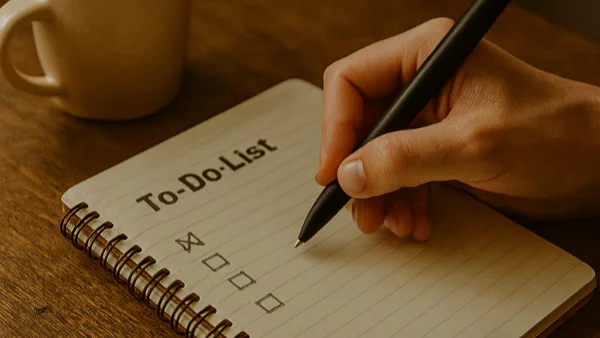
> Feeling burnt out? Subscribe to my Everyday Self-Care Newsletter for self-care tips and doable habits that support your well-being.
Some days, your to-do list feels like it’s running the show. You start the morning with good intentions, ready to tackle what’s in front of you, but by the afternoon, new tasks have piled on, old ones have rolled over, and the list looks even longer than it did when you began. The feeling of being “behind” follows you through the day, making it hard to focus and even harder to rest.
It is easy to feel like you are failing when you cannot get through it all. The truth is, most to-do lists are set up to overwhelm you. They mix the urgent with the unimportant, the quick with the impossible, and then expect you to move through it all in a straight line. Without a clear system, your brain spends as much energy deciding what to do next as it does actually doing it.
The way to break this cycle is not to push harder or try to work longer hours. It is to work differently. A few simple shifts can help you feel more in control and make steady progress without burning out.
Start with what matters most
Instead of scanning your list and feeling the weight of everything at once, pause. Look at it and ask yourself which two or three things will make the biggest difference today. These are your priority tasks. If you do only these, the day will still count as progress. Everything else can wait its turn. This approach gives you a clear focus and removes the pressure to do everything all at once.
Break big tasks into smaller pieces
Large tasks are sneaky. They look like one line on a list, but they can hide hours of work inside them. That’s why they stay there for days, or even weeks, untouched. If something feels heavy or hard to start, break it down into steps so small you cannot fail to do them. Opening a document. Making one phone call. Gathering the materials you need. The smaller the first step, the easier it is to begin.
Match tasks to your energy
Not every job requires the same level of focus. If your mind is sharp, work on the tasks that need the most thought or creativity. If your energy is low, choose the simple, repetitive items that keep you moving without draining you further. Matching the right task to the right moment means you work with your natural rhythms instead of against them.
Cut what does not belong
Some items stay on a list for weeks because they do not really need to be done. Ask yourself if each task still matters. Does it move you toward something important? Does it need to be done by you, or could it be delegated? Does it need to be done at all? Letting go of the unnecessary is one of the fastest ways to make a list feel lighter and more achievable.
Protect your time from new demands
To-do lists grow fast when you say yes to everything. If new requests come in, do not automatically add them to today’s list. Decide when, or if, they deserve a place. If they matter, schedule them into a specific day instead of letting them take over the one you are already in.
The goal is not to finish every single task as quickly as possible. The goal is to end the day knowing you spent your time on what mattered most. Your list will never be truly empty, but it can feel calmer, clearer, and more under control. And that is how you finally get through it, one choice at a time.


